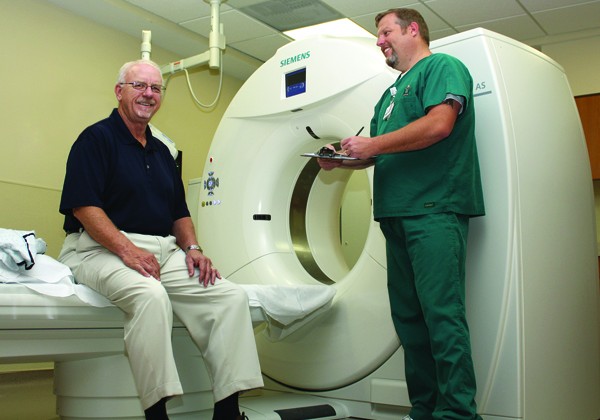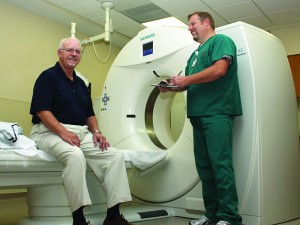CT Scan Increases Chances

St. Mary’s Hospital
Leading Edge
As a 20-something soldier in the U.S. Army, Michael Dugan of Leonardtown, Maryland, smoked his first cigarette.
“It was the thing to do in those days,” he said. Fast forward 40 years, Michael spent the last year and a half battling lung cancer. Now cancer free, Michael is thankful that his doctor suggested he have a Computed Tomography (CT) scan at Medstar St. Mary’s Hospital in late 2009.

St. Mary’s Hospital patient Michael Dugan, left, credits an CT scan with givning him the opportunity to treat his lung cancer.
It was the CT scan that revealed nodules formed on Dugan’s lung – nodules that went undetected by earlier X-rays. By the summer of 2010, Dugan traveled to fellow MedStar Health facility Washington Hospital Center where Dr. Keith Mortman, director of minimally invasive surgery, removed the cancerous nodules. In one month’s time, Dugan recovered from the surgery and underwent additional screenings in the Diagnostic Imaging Department back at St. Mary’s Hospital. As a result, 25 lymph nodes were removed from his body – three cancerous.
Recently, a large clinical trial identified a type of noninvasive CT scanning called low-dose helical (or spiral) CT scanning as reducing the odds of lung cancer death by 20 percent among those age 55 to 74 with a history of cigarette smoking at least one pack per day for 30 years. The study is the first of its kind to confirm a significant improvement in survival in high risk smokers who undergo screening with CT scans.
CT scanning “only makes sense,” said Dugan, who acknowledged the benefits of early detection, particularly since “you only have a 15 percent chance of surviving lung cancer for up to five years.” He credits the early detection with saving his life. “Because they found the cancer early, I had a better chance of surviving.”
Just a year after a CT scan found cancerous nodules on his lungs, Dugan returned to St. Mary’s Hospital to undergo chemotherapy treatments in late 2010. As a Southern Maryland resident, Dugan was able to go through treatments close to home at the hospital’s Cancer Care and Infusion Services (CCIS).
For Dugan, the compassionate care he received at CCIS meant a lot to him. “Dr. Khan [CCIS Medical Director] and the nurses are as caring a group of people you’d hope to find,” said Dugan. In fact, he credits the staff for not only caring for his physical health, but also his mental wellbeing.
During the last months of Dugan’s treatments, he and his wife of 37 years, Gaye, an RN in the Telemetry Department at St. Mary’s, planned a trip to the beach to relieve some stress. Just a day before they were scheduled to leave, Dugan’s white blood count was low – too low for him to travel. The CCIS staff however, made it possible for Dugan to receive treatments at Beebe Medical Center in Rehoboth, Del., giving Michael and Gaye Dugan an opportunity to unwind at the beach. “That’s just one example of how caring they [CCIS staff] truly are,” said Michael Dugan.
After successful completion of his chemotherapy treatments, Dugan returns to the Diagnostic Imaging Department at St. Mary’s for follow-up CT scans every four months. “Lung cancer is so diligent,” said Dugan. “It can spread rapidly and can travel the lymph node highway – having CT scans are worth it.”
At age 64, Dugan has many years to live ahead of him, and he’s spent the last six months regaining his strength in order to live well. Although he is retired, Dugan enjoys traveling part-time in order to provide training on subjects such as government finances and appropriations law. When not on travel, Dugan and his wife enjoy spending time with their family.
The National Cancer Institute sponsored the National Lung Screening Trial (NLST) that involved 33 centers in the United States, including Georgetown’s Lombardi Comprehensive Cancer Center – a sister MedStar Health facility. As a result of the unprecedented findings, MedStar Health entities, including St. Mary’s Hospital, will offer CT scans to patients of high risk.
For more information or to determine your next step in getting screened for lung cancer, please contact your primary care provider. If you need a referral to a primary care provider, please call 301-475-6088. Find more information about the research findings at www.medstarstmarys.org.






















